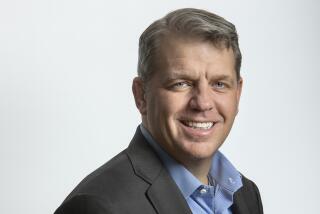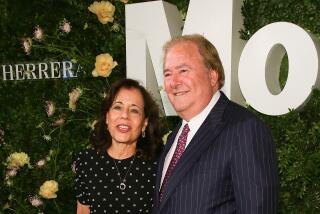Boyd Jefferies; Started L.A. Brokerage Firm
- Share via
Boyd L. Jefferies, the controversial founder of the Los Angeles brokerage firm Jefferies & Co., died Thursday near his home in Aspen, Colo., apparently of a heart attack, a spokesman for the company said. He was 70.
Jefferies was one of the nation’s most powerful traders of big blocks of stock and was a pivotal figure in the corporate raids of the early 1980s.
He had not been involved in the firm he started since 1987, when he resigned as chairman and chief executive after he pleaded guilty to two felony counts related to the illegal “parking” of stock for admitted inside trader Ivan F. Boesky and corporate raider Paul A. Bilzerian.
A federal judge in New York sentenced Jefferies in 1989 to probation and ordered him to pay a fine. Jefferies was given no prison term but was banned from the securities industry. He cooperated with the government and appeared as a prosecution witness in two criminal cases.
Jefferies founded the firm that still bears his name in 1962, building it into a powerful trader of large blocks of stock between institutions. It remains one of the largest brokerages headquartered in Los Angeles, with a market capitalization of $900 million and 1,100 employees in 20 offices around the world.
Rumors had recently circulated that the firm was in negotiations to be purchased by Charles Schwab & Co.
Responding to Jefferies’ death, Tom Tarrant, a spokesman for the firm, said, “We’re all in shock, and we’re all very sorry for his family.”
“He was one of the more passionate people I knew about our business,” said Frank E. Baxter, chairman of the Jefferies Group. “Boyd was a visionary.”
Known for showing up at his firm’s trading desk at 2:30 a.m. and working straight through until 6 p.m., Jefferies was also so committed to pleasing clients that he took different ones home with him for dinner almost every night.
“He was a legend in the securities business, a leader in block trading. He was the premier person in that business,” said Charles Mathewson, chairman of the board of International Game Technology in Reno, who helped Jefferies start Jefferies & Co.
“He loved that company,” Mathewson said.
Jefferies moved to the Aspen area after he was banned from the industry. In Colorado he was involved in trading for his own accounts and charity work, including the Aspen Junior Golf program.
Jefferies came from a relatively poor family in Redlands. He told The Times in 1989 that, when he was young, his family didn’t even have enough money to buy him a baseball mitt. He said he began doing odd jobs at an early age to earn money.
“I grew up in a family that didn’t have very much,” he said. “I knew that if I wanted the better things in life--not that I knew what they were--I’d have to work . . . for them.”
He said his mother, a high school cafeteria worker, was a perfectionist.
“I would mow the lawn and she would come out and look at it and point out all the places where I didn’t do it just right, and she would say, ‘ . . . You’re going to do it again until you get it right,’ ” he recalled.
After graduating from UCLA in 1952, Jefferies roped cattle on an Arizona ranch. He then worked for a small Pasadena securities firm before borrowing $30,000 to start his company.
He is survived by his second wife, Sharon, to whom he was married for nearly 30 years, and a daughter, Carol.
Jefferies’ son, Stephen, was killed in a motorcycle accident in 1981 at age 28. The scholarship program Jefferies administered, called the Steven A. Jefferies Educational Grant Fund, was established in his son’s memory.
More to Read
Inside the business of entertainment
The Wide Shot brings you news, analysis and insights on everything from streaming wars to production — and what it all means for the future.
You may occasionally receive promotional content from the Los Angeles Times.










